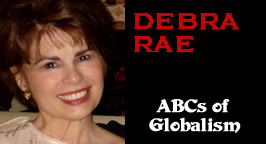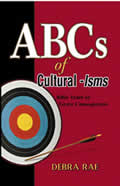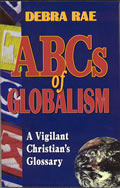THE
LOST ART OF CRITICAL THINKING
PART 6
By
Debra Rae
January 22, 2011
NewsWithViews.com
Recently, the Memorial Drive Presbyterian Church, Houston, joined Christian communities in Atlanta, Seattle, and Detroit to encourage “ecumenical reconciliation” between Christianity and Islam. Theirs was a celebration of a sort of worldview potpourri mixing together elements of Christianity and Islam. Predictably called Chrislam, this brand of ecumenicalism qualifies both the Bible and the Qur'an as holy texts. Hence, in a show of equal authenticity, Qur’ans were positioned in church pews next to Bibles.[1]
Not surprisingly, the American version of Nigerian Chrislamology hops the political correctness bandwagon. For the sake of harmonious coexistence, ecumenical reconcilers value elastic syncretism over orthodoxy, a milk-toast conciliatory gospel over the New Testament Gospel of Jesus Christ. This paradigm shift appears to be compellingly “tolerant”; however, the case for recognizing Chrislam within Christian churches relies solely on fallacies of logic, certainly not biblical compulsion.[2]
Conflict Escalation: Slippery Slope Fallacy
Some argue that if American “tolerance”—i.e., as in the form of Chrislam—were rejected, then the ongoing conflict between East and West would escalate beyond repair. This slippery-slope fallacy presumes a sort of chain reaction, destined to end with dire consequences that otherwise might have been averted.
Truth be told, embracing tolerance in the name of Chrislam—not the opposite—is what really leads to a slippery slope. After all, the Qur’an explicitly subjugates People of the Book (Jews and Christians) as second-class citizens, subject to burdensome fees and Shariah Law. Believers may live, yes, but only under Islamic terms.[3]
Can you say, “separate, but not equal”? Been there; done that; not good. Even if all Christian Americans were to embrace Chrislam, and Israeli Jews were to accommodate demands of neighboring Muslim countries, the ongoing conflict in the Near East would nonetheless persist. Solid evidence is lacking to support assertion that “tolerance” of this ilk can restrain Armageddon or that its lack will trigger it. To the contrary, Qur’an-believing Muslims will continue the fight until the Great Satan (America) and the Lesser Satan (Israel) are wiped off the face of the earth—literally.[4]
Wimpy Doctrine: Straw Man Fallacy
A clever way of strengthening one’s argument is to anticipate opposition, then respond to it in advance. Applying the straw-man fallacy, an arguer sets up a wimpy version of his opponent's position and, then, knocks it down.
A devout Christian, for example, is expected to denigrate Chrislam as apostasy (abandonment of, or departure from, the faith). One who anticipates this response will bypass deal-breaking differences to emphasize superficial similarities between Islam and Christianity—e.g., Abrahamic roots, monotheism, morals and ethics, and the like. Then, he might try to convince others that, only by uniting the world’s two largest monotheistic religions, will rise of atheism and alternative spirituality be thwarted.
Despite apparent similarities, it can’t be emphasized enough that the respective scriptures of Islam and Christianity are fundamentally incompatible. When the Qur’an adamantly rejects the deity of Christ as blasphemy (5:17), and it denies His death on the cross (4:157-158), Islam eradicates altogether any semblance to Christianity. Apostasy established; case closed.
Quacks Like a Duck Theory: Fallacy of Weak Analogy
From God’s vantage point, it’s a daffy idea that just because it looks, acts, and walks like a duck—it is one. He looks, not outwardly, but inwardly. Unfortunately, apart from God, humans lack that ability.[5]
Mirroring the Muslim practice of walking around the Ka'aba in Mecca, Chrislamists engage in "running deliverance," allegedly practiced by Joshua's army upon taking Jericho. But when Chrislam followers practice “running deliverance,” it doesn’t follow that these two examples of “spiritual running” represent one and the same thing.
Indeed, circumambulation—tawaf (¬ ) in Arabic; pradakshina in Sanskrit; skorba in Tibetan—distinguishes many faith traditions. Its practice is integral to Hindu ritual for discovering a deity’s most sacred center of spiritual energy, but no one factors Hinduism into the Chrislam equation.
Merely drawing an analogy between two things (a weak one at that) doesn't prove the fallacious “quacks-like-a-duck” theory proposed by Chrislamists.
The Fast: Begging the Question Fallacy
An argument said to “beg the question” asks one to accept a conclusion without offering weighty evidence. It simply ignores an important, but questionable assumption upon which the argument rests. For example, Emerging Church Movement leader Brian McLaren has written a five-part blog entry arguing why Christians should join with Muslims in the Ramadan fast.
McLaren’s argument rests on the central, but erroneous assumption that, for the sake of congeniality, it’s okay for Christians to fast with their Muslim “brothers” to commemorate the month during which the Qur’an was revealed to Mohammed (2:185).
Consider the Night of Power (Laylat Al Qadr), the 27th night of Ramadan (ninth month on the Islamic calendar). Some scholars apply gematric value (occult mysticism) to it, and devout Muslims (called submitters) who observe the Night of Power expect to earn “double credit” in Allah’s eyes. McLaren forgets that it’s by faith we find favor with God—this, through grace and not by works (i.e., fasting), lest any man should boast.[6]
In advancing his own brand of political correctness, McLaren ignores the erroneous assumption upon which his argument rests. This he does by withholding the preponderance of scriptural evidence: While loving and befriending others is paramount to the Christian faith, the Bible forbids participating in abiblical religious ceremonies.[7]
Abrahamic Heritage: Post Hoc (False Cause)
The “false cause” fallacy gets its name from the Latin phrase post hoc, ergo propter hoc, translated "after this, therefore because of this." It assumes that because B comes after A, A caused B. However reasoned this sounds, correlation isn't the same thing as causation.
In Islamic tradition, the three monotheistic, Abrahamic religions journeyed in a caravan. Having obtained a measure of truth, Judaism pitched tent and went no further. Thereafter, having expanded Judeo truth, Christianity moved forward, but then settled. Only Islam continued full bore to receive maximum truth.
Chrislamists would have us believe that shared Abrahamic heritage spiritually unites Jews, Christians, and Muslims, but this belief presumes an established pecking order generated by the “false cause” fallacy. Because Christianity came after Judaism (and Islam followed Christianity) does not presuppose that Judaism caused Christianity, or that Christianity caused Islam. For Chrislam to claim shared Abrahamic heritage is no “proof” of Islam’s stature as a Yahweh-sanctioned improvement over faith of the fathers.[8]
Cutting-Edge Church Leaders: Appeal to Authority Fallacy
By referencing respected, albeit biased sources or authorities, some employ the “appeal to authority” fallacy. To lend support to their own beliefs, they namedrop, align with, and explain positions held by well-known leaders who may not qualify as subject-specific experts.
Take, for example, Emerging Church leader Dr. Tony Campolo. While Dr. Campolo’s credentials are impressive, he was the subject of an informal heresy hearing in 1985, and for good reason. You see, he’s not convinced that Jesus lives only in Christians. In Campolo’s view, an Islamic “brother” who has fed the hungry and clothed the naked clearly has a personal relationship with Christ, but just doesn’t know it. Accordingly, Campolo excuses many Muslims from need for evangelization. Though not labeled heretical, he was found to be "methodologically naïve and verbally incautious." [9]
Campolo insists “we cannot allow our theologies to separate us,” yet Jesus came with a doctrinal “sword” to do just that.[10] Moreover, about seventy-five percent of Muhammad's biography (Sira) consists of jihad waged on unbelievers. In the words of Dr. Moorthy Muthuswamy, “about sixty-one percent of the contents of the Qur’an … speak ill of the unbelievers or call for their violent conquest; at best only 2.6 percent of the verses … show goodwill toward humanity."
Although Campolo is a popular voice for Chrislam, Jesus is the ultimate authority for Christianity; and Mohammed for Islam. When Campolo contradicts Jesus and/or Mohammed, he forfeits the credibility afforded him by namedroppers hoping to catch the wind of his sails.
“Hath God Said?”: Appeal to Ignorance Fallacy
One who employs the fallacy of appealing to ignorance suggests that the absence of conclusive evidence on a given issue naturally boosts a position the arguer holds. Recall that, in the Genesis account, the serpent toyed with Eve, intimating that her lack of experiential knowledge—i.e., evidence—somehow gave default credence to his own premise, “Ye shall surely live.” [11]
In similar fashion, Emergent Church leaders hold that spiritual edification and growth, inspiration and maturity, work for peace and the common good spring from uniting Islam and Christian worldviews. Without experiential knowledge, those who steer clear of Chrislam are deemed unknowing. Therefore, when arguers pose the biblical query “Hath God said?” they challenge purists to “try it and like it.” After all, what’s to say they won’t?
Political Correctness Bandwagon: Ad Populum Fallacy
A common application of ad populum is the bandwagon fallacy, in which the arguer convinces others to believe something because “everyone else” does. Given that tens of thousands of Americans convert to Islam each year, and Chrislamic gatherings can attract up to 1,500 adherents each week, Christians should join the Emerging Church in its embrace of Chrislam.
The arguer overlooks the fact that, just because 130 prominent Christian leaders signed an agreement that states Muslims and Christians worship the same God, it doesn’t necessarily make it so. Indeed, solid archeological evidence overwhelmingly refutes Islamic identification with the God of the Bible.
In actuality, Islam is a revival of the ancient moon-god cult. Its ceremonies, rites, symbols, and name of its god come from this ancient pagan religion. When the moon-god’s popularity weakened, Arabs continued its worship as their chief deity, Allah (generic for “the god”).[12]
The Common Good: Red Herring Fallacy
The red-herring fallacy introduces a tangential side issue that distracts from what's really at stake. For example, it’s suggested that, when Jesus engaged and thereby learned from the Syrophoenician woman,[13] he overcame his “religious prejudice” as a devout Jew. In spinning the biblical account thusly, the arguer distracts from what’s really at stake—the divinity of a sinless Jesus.[14]
Another example: Though the Qur’an mentions Jesus some twenty-five times (tangential side issue), it also accuses anyone who believes that Jesus is the Son of God as having committed the greatest blasphemy imaginable (Qur’an 19:88). In this case, Qur’anic mention of Jesus is a red herring to distract from what’s really at stake—again, belief in Christ’s divinity.[15] The tactic employed is to knock over the king pin, so all the pins fall.
What’s Really at Stake?
What’s really at stake is orthodoxy. Coming from a Greek root, the word means "straight belief." Correct practice—i.e., orthopraxy—depends on orthodoxy, not tolerance, as Chrislamists would have us to believe.[16]
Not recognized as a world religion in its own right, Chrislam blurs differences and distinctions between biblical Christianity and Islam fundamentalism. Its fuzzy thinking renders Chrislam obscure, indistinct, and hazy—thus, capable of deceiving those unschooled as to its nature.
Predictably, relativism drives the “worldview potpourri” of Chrislam. Given no established “black” or “white”—no scripturally validated truth upon which all can rightfully draw—the core value “not to offend” takes front stage. Never mind that the Bible likens Jesus to a stone of stumbling and rock of offense; some Christians believe they must never offend.[17]
Granted, Chrislamists are not alone in employing fallacious arguments. Many Christians and Muslims do likewise, but then most agree that matters of spirituality and faith transcend logic. Amos 3:3 poses the fitting question, “How can two walk together except they be agreed”? The implied answer is “they can’t.”
As a Christian, I do not hate or shun Muslims, nor do I seek spiritual “common ground” with them, because core incompatibilities between Islam and Christianity preclude perceived, albeit superficial similarities. The Christian faith is founded on the deity of Jesus Christ, the great “I AM,” Immanuel (“God with us”). Were He not divine, Christ’s death on the cross would have been insufficient as an atoning sacrifice for the sins of the world.[18] To compromise basic tenants of biblical Christology is to abandon the faith altogether, thus removing the “Chris” from Chrislam.[19]
| Subscribe to the NewsWithViews Daily News Alerts! |
If I am faithful to the Great Commission of Jesus Christ, I will seek instead to “make disciples of all nations,” Islamic ones included. This isn’t accomplished by might, power, “holy war,” or congenial “give-and-take,” but rather by the spirit of the living God.[20]
Fallacies of logic that Chrislamists employ “stand away from” orthodoxy (whether Christian or Islamic) and, therefore, qualify as apostate. The English word “apostasy” comes from two Greek words. The first is a preposition (apo), which means “away from”; the second, a verb (histemi), which means “to stand.” Biblically, apostates “stand away from” known or previously embraced truth.
Be sure Chrislam is apostate. For a Christian to believe otherwise is self-deception.
Click here for part -----> 1, 2, 3, 4, 5, 6,
Footnotes:
1,
Posted on line
at Paul L. Williams, Ph.D. Qur’an in the Pews; Jesus in the Qur’an.
(Accessed November 2010).
2,
Galatians 1:6.
3,
William Wagner, Th.D. How Islam Plans to Change the World (Grand Rapids,
MI: Kregel Publications, 2004), 108-109.
4,
Ibid, 219-236.
5,
1 Samuel 16:7
6,
Ephesians 2:8; Titus 3:4-6
7,
2 Corinthians 6:14-15
8,
Galatians 1:6.
9,
Posted on line at wikipedia.org
(Accessed November 2010).
10,
Matthew 10:34-36
11,
Genesis 3:1
12,
James 1:17
13,
Mark 7:26; Matthew 5:22
14,
Matthew 15:21 ff, Mark 7:24 ff
15,
1 John 2:22, 23
16.
Matthew 7:14 with 1 Corinthians 12:31; 2 Peter 2:1-2, 15
17.
1 Peter 2:7-8
18.
1 John 2:2
19.
2 Timothy 3:16 with John 10:35
20.
Zechariah 4:6












 Share
This Article
Share
This Article







